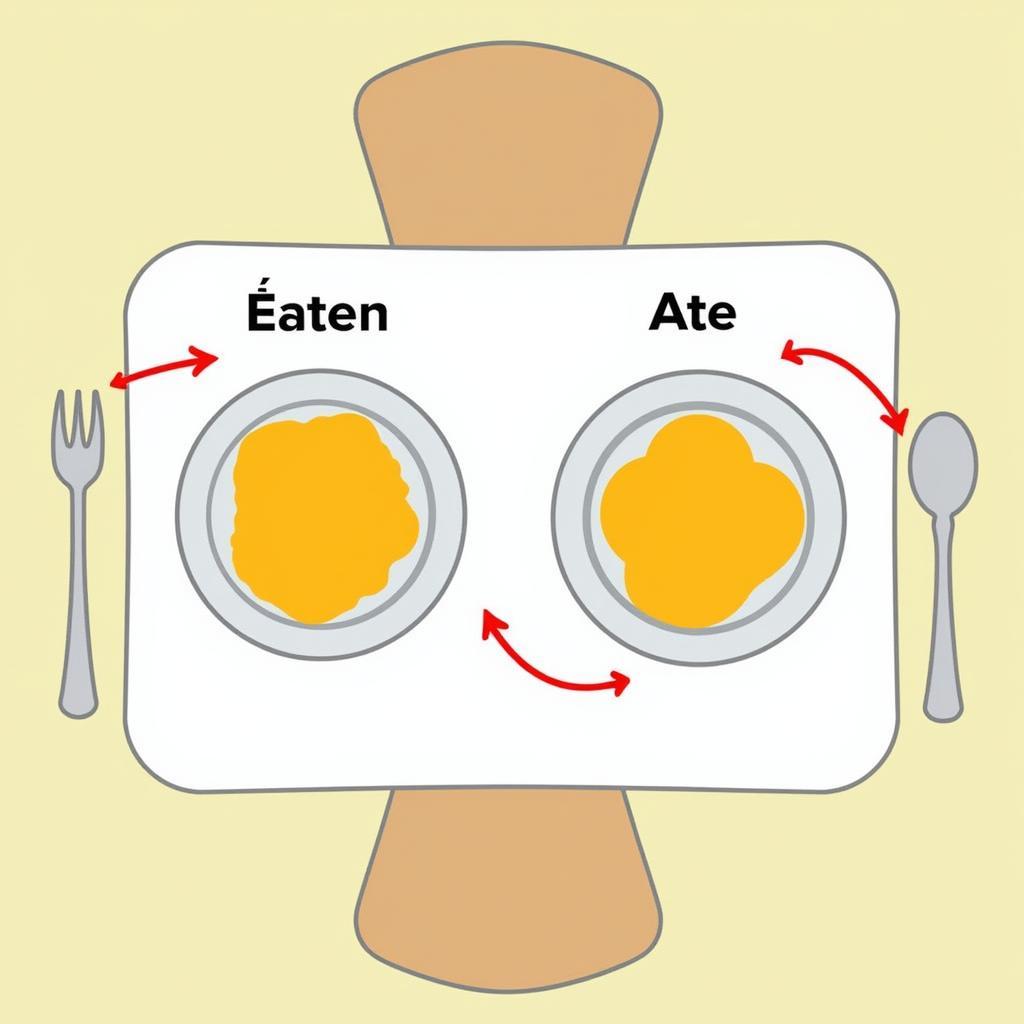The English language, known for its quirks and complexities, often presents challenges even for the most seasoned speaker. One such stumbling block lies in the realm of irregular verbs, with “eat” being a prime example. While the infinitive form may seem simple enough, its past tense forms, “eaten” and “ate,” often leave learners and even native speakers pondering their correct usage. This article aims to clarify the distinction between “eaten” and “ate,” equipping you with the knowledge to navigate these tricky verb forms with confidence.
Unraveling the Past Tense: “Ate”
“Ate,” the simple past tense of “eat,” signifies a completed action in the past. It stands alone, unaccompanied by any auxiliary verbs, to denote a single occurrence of eating. For instance:
- Yesterday, I ate pizza for dinner.
- She ate a hearty breakfast before her morning run.
In these examples, “ate” succinctly conveys the past action of eating without the need for further elaboration.
Embracing the Perfect Tense: “Eaten”
“Eaten,” on the other hand, takes on the role of the past participle of “eat.” Unlike “ate,” it necessitates the presence of an auxiliary verb, typically “have” or “has,” to form the present perfect or past perfect tense. These tenses come into play when highlighting the completion of an action or its relation to another past event.
Present Perfect Tense:
- I have eaten all the cookies!
- They have eaten at that restaurant before.
Past Perfect Tense:
- By the time I arrived, they had eaten all the food.
- She realized she had eaten too much candy.
In each of these instances, “eaten” partners with an auxiliary verb to emphasize the finished state of the eating action. The present perfect connects the past action to the present, while the past perfect situates it before another past event.
A Handy Tip to Remember
A simple trick to determine the correct usage lies in the auxiliary verb. If your sentence requires “have,” “has,” or “had” alongside “eat” in the past tense, “eaten” is your go-to choice. Conversely, if your sentence expresses a simple past action without the need for an auxiliary, “ate” fits the bill.
Common Scenarios: “Eaten” vs. “Ate”
Let’s delve into some everyday situations to solidify your understanding:
-
Scenario 1: You are at a restaurant, and the waiter asks if you’re ready to order. You haven’t eaten anything all day, so you respond, “Yes, I’m starving! I haven’t eaten all day.”
-
Scenario 2: Your friend asks about your weekend activities. You recount a memorable meal, saying, “On Saturday night, I ate at that new Italian place downtown. The pasta was incredible!”
FAQs: “Eaten” vs. “Ate”
Q1: Can “eaten” be used without an auxiliary verb?
A: No, “eaten” always requires an auxiliary verb (“have,” “has,” or “had”) to form the present perfect or past perfect tense.
Q2: Is there a difference between “I have ate” and “I have eaten”?
A: Yes, “I have ate” is grammatically incorrect. The correct form is “I have eaten,” as “eaten” is the past participle of “eat.”
 Eaten vs. Ate
Eaten vs. Ate
For further exploration of English grammar intricacies, check out our article on the distinctions between the past simple and past perfect simple: past simple vs past perfect simple.
Mastering the nuances of “eaten” and “ate” may seem like a small victory, but it represents a significant step towards conquering the intricacies of the English language. Remember the simple rule of thumb: auxiliary verb equals “eaten,” while a simple past action calls for “ate.” With practice and these helpful tips, you’ll be confidently navigating the past tense of “eat” in no time.
Need further assistance with your English language journey? Reach out to us!
Phone Number: 02838172459
Email: truyenthongbongda@gmail.com
Address: 596 Đ. Hậu Giang, P.12, Quận 6, Hồ Chí Minh 70000, Việt Nam
Our dedicated team is available 24/7 to provide comprehensive support and guidance.